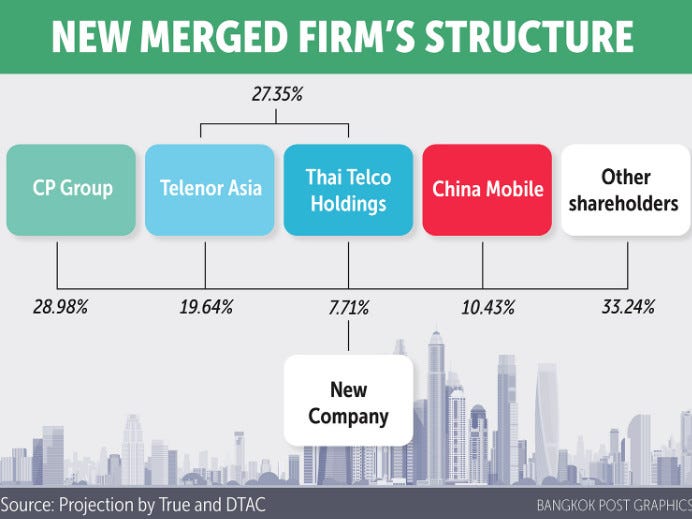Thailand set to allow the creation of a mobile duopoly
The Thai telecoms regulator has reportedly decided to allow the second and third national mobile players to merge, effectively creating a duopoly.
October 21, 2022

The Thai telecoms regulator has reportedly decided to allow the second and third national mobile players to merge, effectively creating a duopoly.
According to the Bangkok Post, True has a 34% share of the Thai mobile market and DTAC has 21%, so their merged operations would have the majority of subscribers, with current number one player AIS having 44%. As you would expect, the regulator NBTC is attaching a bunch of strings to the move but they are unlikely to completely reassure those who regret the resulting reduction in competition and customer choice.
The merger was first proposed almost a year ago, with concerns about its implications arising immediately. By April it was starting to look like it was a done deal but by August NBTC decided it needed to have a closer look at it. Quite what it was looking for is unclear since the market dynamics at play remain clear and constant, so we can only assume it wanted to fine tune the remedial measures, which seems to mainly involve price controls.
The graphic below illustrates the ownership structure of the new company (imaginatively called NewCo) according to the Bangkok Post. It should be noted that the numbers in the table don’t correspond precisely with its written account.

This is unlikely to be the end of the matter. The reasons to object to the move haven’t disappeared and the decision seems to be as much a capitulation as anything else. Nikkei Asia reports the ‘powerful forces’ behind the move threatened NBTC with legal action if it blocked the move, which calls its independent regulatory power into question. On the other hand, The Thailand Consumer Council apparently plans to file a complaint.
It seems quite likely that this will evolve into as much a political as business or regulatory affair. If the agencies in charge of protecting the interests of Thai consumers are seen to be bullied by some of the country’s richest people into bending to their will there will surely be some kind of public backlash. That will be further inflamed if prices end up rising as a result of the merger.
Get the latest news straight to your inbox. Register for the Telecoms.com newsletter here.
About the Author
You May Also Like


.png?width=300&auto=webp&quality=80&disable=upscale)







.png?width=300&auto=webp&quality=80&disable=upscale)


_1.jpg?width=300&auto=webp&quality=80&disable=upscale)